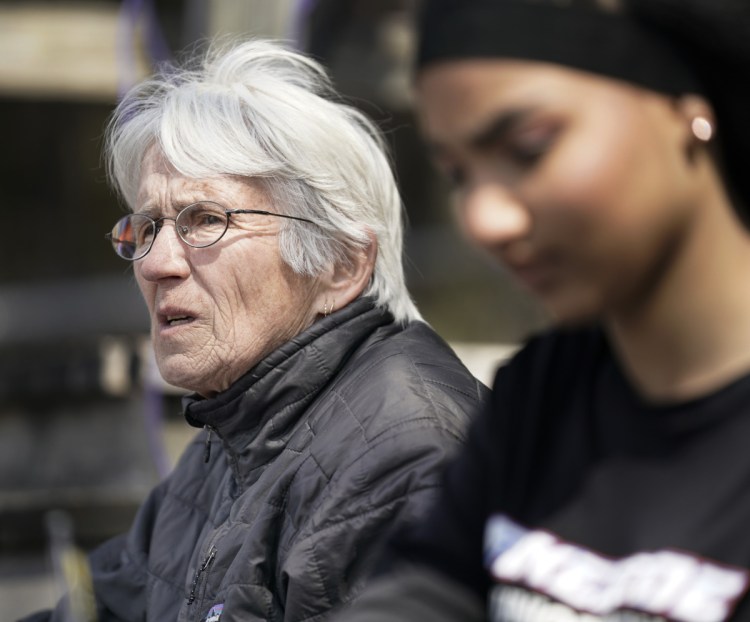TOPSHAM — Diane Fournier, 70, attended school before the advent of Title IX, but that never stopped her from creating her own opportunities and pursuing the competitive sports she loved.
In 1970, Fournier was one of five women to run unofficially in the Boston Marathon, the year before women were allowed to register for the race.
That history has made an impression on her athletes.
“She knows what she’s talking about. She ran in the Boston Marathon before women were allowed,” said Mt. Ararat senior distance runner Katherine Leckbee.
Forty-three years ago, Fournier took over as the track and field coach at Mt. Ararat – a position she’s held ever since.
Many high school sports in Maine boast long-time coaches. It’s not uncommon for a celebrated coach to retire after leading a team for two or three decades.
But in track and field, there seem to be an inordinate number of coaches who have led the same program for anywhere from a quarter of a century to almost 50 years.
Ron Ouellette has coached the Biddeford track and field team for 43 years. Ron Kelly has coached the Scarborough girls for 46 years, and Scarborough assistant coach Steve Ross has coached hurdlers for 38 consecutive years – almost 50 in total, given that he stepped away briefly to get a surveyor’s license. Ted Hutch, who started the track program at York, has been there for 27 years. The list goes on.
At least a dozen coaches in southern Maine have led track and field programs at the same school for more than 25 years.
Gorham High’s John Caterina – the Rams’ coach for 30 years – said track and field simply offers another classroom for instruction.
“To me, it’s all just one job, teacher as coach, coach as teacher,” said Caterina, 55, who teaches chemistry.
Fournier, who still runs daily with her dogs (which she brings to practice), said coaching is fun. Some, like Ross at Scarborough, even said it’s a calling.
But all agree coaching the same sport at the same high school for 25 to 50 years is only possible in a sport where “everybody plays” – meaning less criticism and interference from parents and school administrators.
“Nobody is cut in track,” Ouellette said. “There’s an event for everyone. I know, I used to coach football. The worst is basketball – only five players on the court.”
“One major difference with track from most team sports is that there is not the parental pressure for ‘playing time,'” Caterina said.
“As we like to say, ‘No one sits on the bench’ in track and field. We can always find an event for a kid.”
According to several veteran track and field coaches, the athletes benefit when a coach brings consistency, a tradition of leadership and a track record, so to speak, for demanding respect.
“They know what to expect from me,” Fournier said. “They know the rules and that I expect them to follow them.”
These coaches say after so many years, they learn what to look for and recognize different needs in athletes, be it academic, financial or an injury.
Ouellette has lifelong ties to Biddeford. “I ran track here,” he said. “I’m home-grown.”
In his 43 years, Ouellette has won team titles and has coached state champions and record holders, All-Americans and athletes who earned full scholarships at NCAA Division I schools. He said it’s always different, always challenging and always rewarding. Mostly, he said it’s a way to make a difference.
“I think kids like stability. There are a lot of reasons why outside school, they don’t have stability,” he said. “They know when I ask them to do something, I expect them to put in the effort. I take a more laid-back approach. But they know where I stand.”
One time, Ouellette had an athlete who was living in a homeless shelter and was without food at the day-long meets on the weekend.
“He was having great workouts, but at the meets, something was not right. Another coach explained to me what was going on,” Ouellette said. ‘”I’d bring him a bagel, orange juice, a sandwich when I went to Dunkin’ Donuts in the morning.”
But, Ouellette said, winning and setting goals is also part of what is important in track.
“I’m very competitive. Our girls’ team won in 1998 with just seven young ladies,” said Ouellette, whose girls’ teams also won four straight Class A championships from 1980 to 1983.
“That gets lost. People forget it’s an interscholastic sport. It’s not intramural. (Varsity) track is about being the best you can be.”
John Folan, the Greely coach for 24 years, put it this way: “We are an ancient and honorable community of coaches. We have deep and abiding respect for one another and get along extraordinarily well, despite our obvious goal to beat one another.”
Deirdre Fleming can be reached at 791-6452 or:
dfleming@pressherald.com
Twitter: FlemingPph
Send questions/comments to the editors.




Comments are no longer available on this story